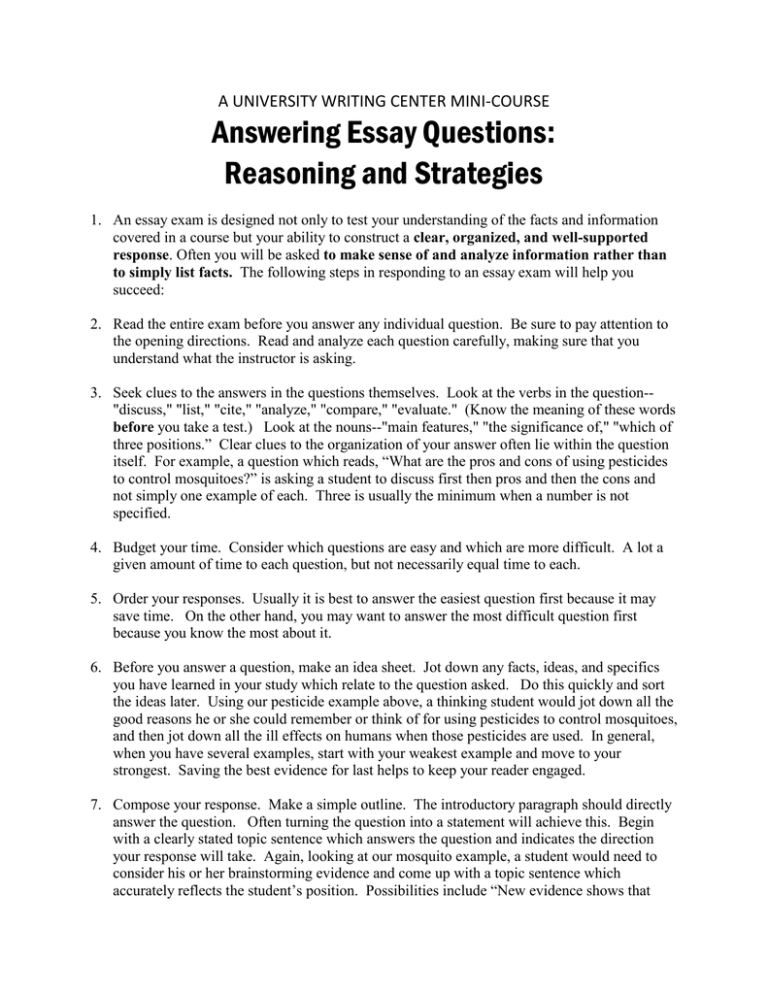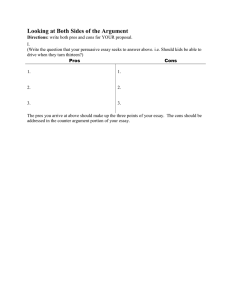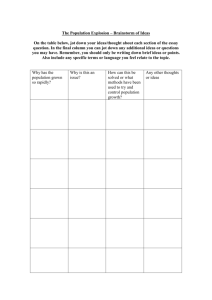Answering Essay Questions: Reasoning & Strategies
advertisement

A UNIVERSITY WRITING CENTER MINI-COURSE Answering Essay Questions: Reasoning and Strategies 1. An essay exam is designed not only to test your understanding of the facts and information covered in a course but your ability to construct a clear, organized, and well-supported response. Often you will be asked to make sense of and analyze information rather than to simply list facts. The following steps in responding to an essay exam will help you succeed: 2. Read the entire exam before you answer any individual question. Be sure to pay attention to the opening directions. Read and analyze each question carefully, making sure that you understand what the instructor is asking. 3. Seek clues to the answers in the questions themselves. Look at the verbs in the question-"discuss," "list," "cite," "analyze," "compare," "evaluate." (Know the meaning of these words before you take a test.) Look at the nouns--"main features," "the significance of," "which of three positions.” Clear clues to the organization of your answer often lie within the question itself. For example, a question which reads, “What are the pros and cons of using pesticides to control mosquitoes?” is asking a student to discuss first then pros and then the cons and not simply one example of each. Three is usually the minimum when a number is not specified. 4. Budget your time. Consider which questions are easy and which are more difficult. A lot a given amount of time to each question, but not necessarily equal time to each. 5. Order your responses. Usually it is best to answer the easiest question first because it may save time. On the other hand, you may want to answer the most difficult question first because you know the most about it. 6. Before you answer a question, make an idea sheet. Jot down any facts, ideas, and specifics you have learned in your study which relate to the question asked. Do this quickly and sort the ideas later. Using our pesticide example above, a thinking student would jot down all the good reasons he or she could remember or think of for using pesticides to control mosquitoes, and then jot down all the ill effects on humans when those pesticides are used. In general, when you have several examples, start with your weakest example and move to your strongest. Saving the best evidence for last helps to keep your reader engaged. 7. Compose your response. Make a simple outline. The introductory paragraph should directly answer the question. Often turning the question into a statement will achieve this. Begin with a clearly stated topic sentence which answers the question and indicates the direction your response will take. Again, looking at our mosquito example, a student would need to consider his or her brainstorming evidence and come up with a topic sentence which accurately reflects the student’s position. Possibilities include “New evidence shows that 2 controlling mosquitoes with pesticides includes both pros and cons,” or “The pros for controlling mosquitoes with toxic pesticides clearly outweigh the cons because of the deadly diseases mosquitoes carry,” or “The pros for controlling mosquitoes with pesticides no longer clearly outweigh the cons because of new evidence which links these pesticides with tumors in laboratory animals.” Get the idea? 8. Supportive paragraphs need topic sentences as well and must contain concrete facts as support--dates, names, concepts, numbers, quotes, book or story titles, etc. Also try to incorporate specific terms used in the course. 9. Leave space between your answers for any additions, which may occur to you while answering other questions or while reviewing your answers. Use an * to insert the material in its proper place in your essay. Words in Questions of Information Define: Describe, Discuss: Give the exact meaning of the topic. How is it different from everything else of its type? Tell what happened or what the topic is. Concentrate only on primary or most important features. Explain: Tell the main reasons why the topic happened or happens. Illustrate: Give one or more examples of the topic, relating each to the topic. Relate: Show how the topic had an effect on something else; in other words, show the connection(s) between two things. Trace: Give a series of important steps in the development of an historical event or a process or any sequence of happenings. Words in Questions of Comparison/Contrast Compare: Show how two things are both alike and different. Contrast: Show only the differences between two things. 3 Key Words in Questions of Argument and Interpretation Agree or Disagree: Give your opinion about the topic. You must express either a positive or a negative opinion or a clear reasonable discussion of how you might agree in some ways and disagree in other ways. Disagree: Support your opinion from appropriate sources. Analyze: Break down the topic into its parts and explain how the parts relate to each other and to the whole topic. Critique, Criticize: Break the topic into its parts (analyze); explain the meaning (interpret); and give your opinion (evaluate). Evaluate: Give your opinion about a topic. You may make both positive and negative points, but you must come to some conclusion about the relative weight of good and bad points. Interpret: Explain the meaning of the topic. Give facts to support your point of view. Justify, Prove: Give reasons to show why the topic or assertion is true. Use examples. Sample Essay Questions 1. What is feedback and how does it relate to effective communication? 2. "Acid rain" is a phenomenon we have become aware of in the last twenty-five years. What are the effects of acid rain on the environment? 3. In what ways does an alcoholic's drinking behavior differ from that of a nonalcoholic? 4. From what you know of American history, do former generals make good presidents? 5. "All I did was return the car late to the used car lot," said Ms. DeWall. "Now they're charging me with embezzlement." She had taken a used car out on a test drive at 4 p.m. and when she returned, the car lot was closed. She then drove the car 300 miles into a neighboring state and returned the car to the lot early the next morning. Was this embezzlement? Explain by defining embezzlement, applying the facts of the case to the law, and discussing possible defenses to the charge. 6. Compare career education with vocational education. 4 7. Few individuals are so well known and so little understood in American history as Columbus. Using Christopher Columbus, Mariner and our textbook discussions as your sources, write an essay in which you explain first of all how Columbus' early life both helped and hurt him in his efforts to sail a fleet across the Atlantic. Next, explain what other factors led many European governments to ignore Columbus. Lastly, discuss why Columbus died a bitter man. …composed by Barbara Carter, Answering Essay Questions, 1989, University Writing Center, Western Carolina University; revised by Barbara Hardie, 2001.



